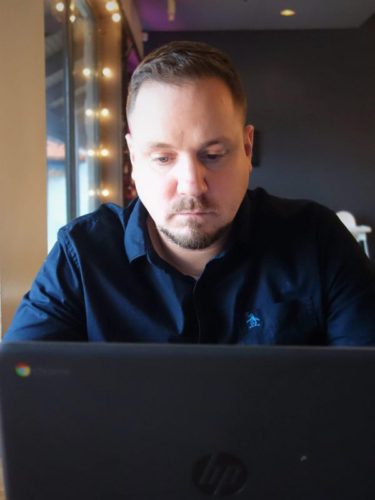Online hate is now mainstream, and experts warn it is only going to get worse

Hate is shifting online, and Canada is struggling to keep up.
After over a decade in organized hate groups, Brad Galloway is now helping people to escape similar situations. He assists former members hate groups and start building their lives after they leave. Brad is now co-ordinator at the Centre on Hate, Bias, and Extremism at Ontario Tech. He used to be a member of a skinhead gang, and leader in the hate group Volksfront, a North American white separatist organization. He gave up a life of hate more than 10 years ago and is now fighting to prevent extremism.

caption
Brad Galloway Source: Organization for the Prevention of ViolenceGalloway describes his childhood as normal for a kid growing up in Toronto. He didn’t have many problems until his adolescence when he started partaking in what he describes as “risk taking” behaviors. His family was education-oriented, and placed an emphasis on good grades, and a post-secondary education. He never felt that he fit into that mold.
Early in his teenage years, he became involved with drugs, fights, crimes, and “went to jail a bunch.” In his late teens he reconnected he reconnected with an old friend who had joined a skinhead group. Galloway didn’t think much about the group’s ideology, he just enjoyed the comradery, and hanging out with the guys. He didn’t formally join an organized hate group until he moved to British Columbia in his early 20s. While in the groups, they spent most of their time listening to music, or speakers who would spout hateful ideologies.
During his years in the white supremacist movement, Galloway, who considers himself a history buff, always knew there was something off with their other members’ revisionist versions of history. He began to correct members of his group when they would often share wild conspiracy theories around the Holocaust. He began to question the motivations and ideologies of his group, but didn’t leave until he got a push.
“Imagine having to wake up and being like I really hate Black people, but do you though?”
Galloway credits his wife for pulling him away from organized hate groups. She helped him realize what he was doing is wrong. She dispelled the hateful conspiracy theories and ideas that he used to believe. The birth of his child was the last straw, he couldn’t imagine bringing a kid into the world. So he cut ties with his former life in 2011.
A period of transition followed, and he knew he needed to find a new path. In 2014, took courses at university, and then began a degree in criminology. He met academics studying right-wing extremism while in school, they prompted him to research extremism, and the prevention of extremism.
After graduating, he began to work with groups like Life After Hate and the Organization for the Prevention of Violence. He now travels across North America to bring awareness, and to fight against extremism. He uses his experience to help other people escape hate groups.
Hate Crimes
Coinciding with the start of the COVID-19 pandemic, Statistics Canada observed an increase in anti-Asian sentiments across the country. In 2020, Statistics Canada said an increase in time spent online correlated with an increase of hate crimes.
Social media acts as a virtual town hall, and when not properly regulated can be used to promote hateful and untrue propaganda. Galloway said there has been a shift in the white supremacist movement since he left.
They now use the news media, which they once despised, to their benefit. Previously, group members refused to talk to mainstream media, because it was a part of their ideology that the Jewish-run media was out to get them. But now, white supremacists are happy to receive any amount of traditional news coverage, said Galloway. This has also become common place on social media sites, where racist content is readily available.
(To highlight a group, click the colour beside a name in the legend to the right. To return to the original view, double click the same colour.)
Sara Thompson studies hate, everything from online expressions of hatred to policing hate. Ideological extremism within extremist groups is the hardest form of extremism to address because “it is part of someone’s world view,” she said.
Through her research, she found it is rare for people in hate groups to completely change their ways. She is the graduate program director of criminology at Toronto Metropolitan University, and the associate director of the Canadian Network for Research on Terrorism, Security and Society.
Thompson said that her research found that only one-third of hate crimes are reported. This is important to outline because the numbers involved in this, or any other stories, are only reported hate crimes. The true number of hate crimes in Canada is far higher than the numbers show, said Thompson.
Also, it is important to consider that some crimes may well be hate crimes, but they are not charged as so due to prosecutorial discretion when prosecutors decide to not charge an aspect of a crime because they feel it will be too hard to get a conviction.
Thompson has worked closely with the Ontario Association of Chiefs of Police to help educate officers on how to talk down extremists by advocating for non-violence, and disproving their views.
Thompson said many of Ontario’s hate crime units she has spoken are overworked, and underfunded. The approach to stopping extremist ideologies is different for every organization. Thompson said police officers do not have adequate training or resources needed to properly monitor or prevent the rise in hate.
If officers engaging with the extremist are not properly trained in disengaging radical beliefs, they can do more damage than good, further entrenching extreme beliefs. There was a 27 per cent increase in police-reported hate crimes in Canada in 2021, the most recent year for which statistics are available.
Barbara Perry, the director of the Centre on Hate, Bias, and Extremism researches hate crimes and right-wing extremism and has recently been studying Islamophobia, and anti-LGBTQ+ hate.
Perry said from her research, only around 15 to 20 per cent of hate crimes are perpetrated by people in far-right, hate groups. Most hate crimes and online hate are committed by people influenced by hate groups online, but are not member of said groups.
Online Hate Legislation
The federal Liberals made policing online hate a 2021 election promise. In July 2021, the Liberal government proposed an amended Bill C-36 in hopes of better regulating hateful online activity. The amendment has yet to be passed. It’s fate is unclear.
The bill’s author, NDP House Leader MP Peter Julian, believes his proposal will lead to greater accountability for the current issues involving online radicalization. He held a town hall in Halifax on March 25 to discuss his plan to force technology companies to publicly disclose their algorithms, potentially opening the companies to liability for radicalizing extremists. Julian blames social media algorithms for pushing people towards increasingly provocative, and hateful content.
The Liberals have no interest in passing online hate legislation, said Julian. He hopes to build public interest in the issue through more town hall style meetings across Canada.
The Conservatives’ critique of the potential legislation is that it interferes with freedom of speech. Conservative members of parliament such as Raquel Dancho of Kildonan—St. Paul, Man. argue that the implementing a government run regulator of online posting would be too subjective, and would give the ruling party too much power to decide what can be said and viewed online.
Perry has been closely following the government’s push for online hate legislation. She said that while she does appreciate the consultation and open forums on the Bill C-36 amendment, she thinks it has been debated for too long.
Canadians need to remember that we are not free speech absolutists like the United States, and that there are limits as to what you can and cannot say in Canada. Her research has largely focused on creating safe spaces for young people online. She talked about the problems with online gaming, and how white supremacists are using gaming to help recruit younger people to their ideologies. Young gamers are approached through in-game chat lobbies, and the white supremacists use the platform to spread hateful messaging.
Legislation can help stop hate from making its way into the mainstream, according to Brad Galloway. “There should be some amendments made, and it should be pushed through in a more expediated manor,” he said.
Galloway understands the limitations of online hate legislation and explained the intent is to make safe spaces on the internet for all Canadians, free of harassment.
Alex Khasnabish has conducted extensive research on radical politics and the far right in Canada. The professor at Mount Saint Vincent University in Halifax believes the federal government is taking the wrong approach to preventing online hate and that its attempts to use online censorship do not address the root of the problem.
He argues that there needs to be more grassroots campaigns led by community leaders to prevent hate groups from forming. Having a productive dialogue with members of hate groups, without shaming them is key to making inroads. Khasnabish argues that there are a lot of economic factors that have led to the rise of far-right, white nationalist extremism in Canada.
People are looking for solutions to social and economic problems, and he says that the far-right groups are using the government’s indifference on crucial issues such as the unaffordability of living in Canada to push their messages of hate. The idea that white Canadians are being left behind is central to the white supremacist groups’ messaging.
Preventing Hate
Preventing hate is now Galloway’s job. He regularly works with people who are in the transition period of their life, in between being in a hate group, and finding a new purpose. He describes himself as a-political, but wants more done to prevent the proliferation of hate on the internet. He lamented that the Elon Musk takeover of Twitter has further pushed hate into the mainstream because of the removal of some of the content regulation from the site.
Because he’s concerned with how people are so easily being radicalized by the now online content, Galloway will continue to combat the kind of hate he onced embraced.
